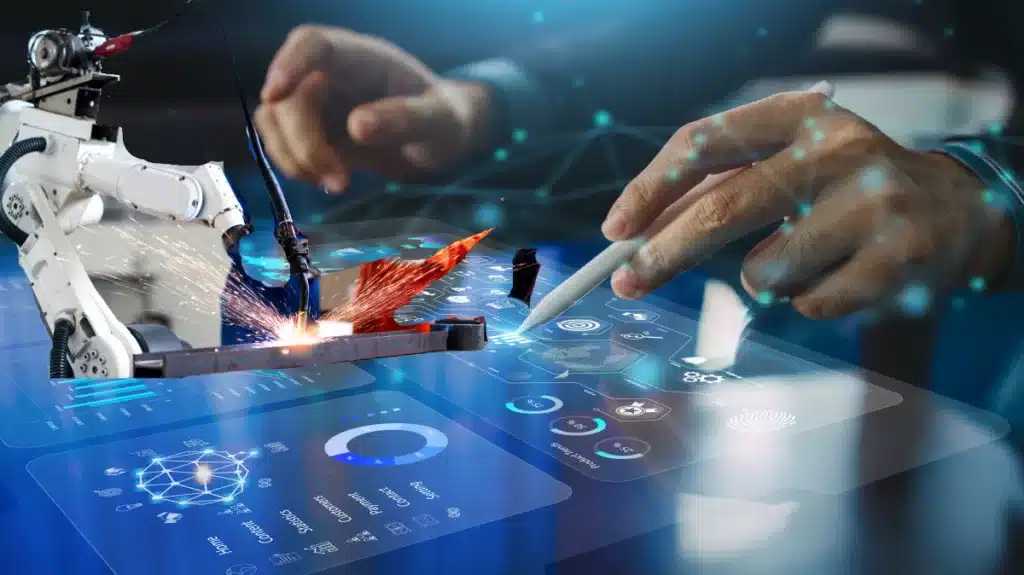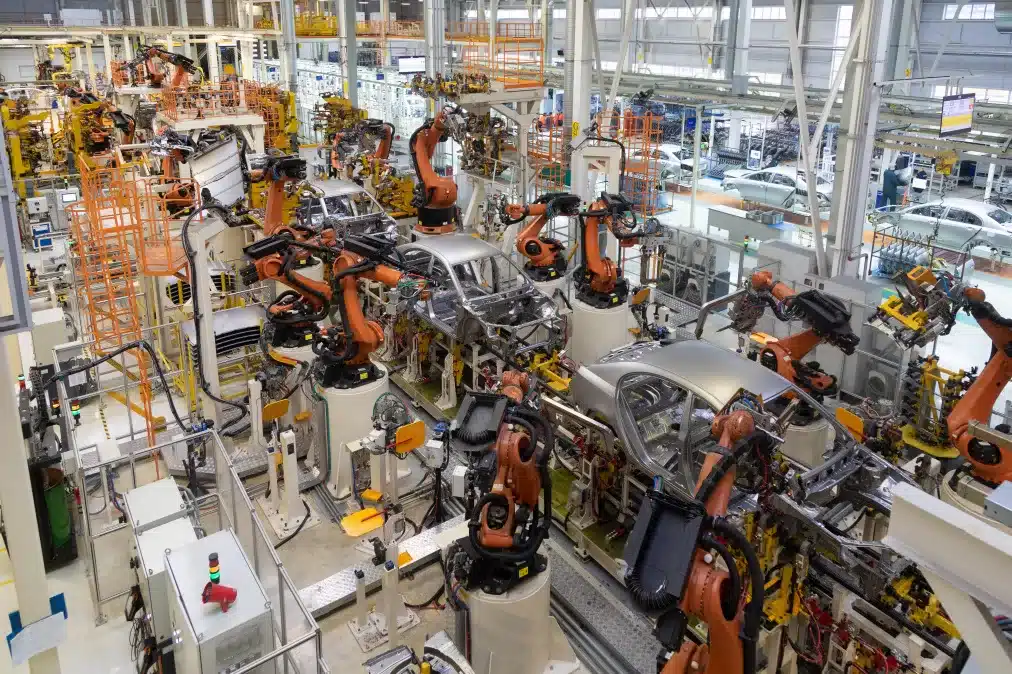AI impact on future labor market
Artificial Intelligence (AI) has emerged as a game-changer, revolutionizing industries and economies worldwide.
With its ability to process vast amounts of data, learn from patterns, and make decisions independently, AI brings numerous benefits and opportunities to businesses and individuals.
Artificial Intelligence (AI) is transforming the job market and changing the skills that employers value in their employees.

The impact of AI on the future labor market is a topic of much discussion and speculation.
While AI is expected to automate many routine tasks, it is also expected to create new jobs in the fields, ranging from big data and machine learning to information security and digital marketing.
This article will examine the complex impact of AI on the workforce, covering its positive advancements and the challenges it poses.
Understanding Artificial Intelligence (AI)
Before dig into AI’s impact on the labor market, it is essential to understand what AI is. AI refers to the simulation of human intelligence in machines programmed to think and perform tasks like humans.
These machines can analyze data, recognize patterns, learn from experience, and make decisions independently.
AI’s Influence on the Labor Market
-
Automation and Efficiency

One of the most significant impacts of AI on the labor market is automation. AI-powered machines can automate repetitive and unexciting tasks, allowing human workers to focus on more complex and creative aspects of their jobs.
In manufacturing, AI-driven robots can handle assembly line tasks, leading to faster production and reduced errors.
Customer service chatbots can address basic inquiries, freeing up human agents to handle more complex interactions.
AI’s data analysis capabilities also enable businesses to make data-driven decisions promptly, enhancing overall efficiency and productivity.
-
New Job Opportunities
While AI may automate certain tasks, it simultaneously creates new job opportunities. As industries embrace AI technologies, the demand for skilled professionals in AI-related roles surges.
Jobs such as AI trainers, AI auditor, data scientists, machine learning engineers, and AI ethicists become increasingly vital to ensure the proper functioning and ethical implementation of AI systems.
-
Economic Growth
The integration of AI into various sectors has the potential to drive economic growth.
By enabling businesses to innovate, optimize processes, and develop new products and services, AI (Artificial Intelligence)contributes to overall economic expansion.
Increased economic activity creates a ripple effect, leading to additional job creation in supporting industries and further stimulating economic development.
Furthermore, AI can significantly impact small and medium-sized enterprises (SMEs) by leveling the playing field.
Smaller businesses can leverage AI technologies to streamline their operations, enhance customer experiences, and compete with larger corporations more effectively, potentially leading to increased job opportunities.
-
Enhanced Decision-Making
Data analysis and insights derived from AI systems empower professionals to make more informed and data-driven decisions.
In healthcare, AI algorithms can assist doctors in diagnosing diseases more accurately, leading to improved patient outcomes.
In finance, AI-powered risk assessment tools help financial institutions make better lending decisions, reducing the likelihood of defaults.
By augmenting human intelligence with AI-generated insights, workers can make more strategic choices, ultimately leading to improved efficiency and performance across various industries.
Challenges Posed by AI in the Labor Market
-
Job Displacement
Despite the creation of new job opportunities, AI’s automation potential raises concerns about job displacement.
Tasks that are highly repetitive, rules-based, and easily definable are most receptive to automation, leading to the potential elimination of certain job roles.
This displacement is particularly concerning for workers in industries heavily dependent on routine tasks, such as manufacturing, retail, and data entry.
Additionally, the pace of AI adoption may outstrip the creation of new AI-related jobs, leading to a temporary gap in the labor market and potential unemployment for some workers.
-
Skill Mismatch
The adoption of AI technologies creates a demand for specific technical skills, leaving some workers with outdated skill sets at a disadvantage.
This skill mismatch can increase unemployment and further widen the skills gap between workers and the requirements of emerging job roles.
To ease this challenge, governments, educational institutions, and businesses must collaborate to offer upskilling and reskilling programs to ensure the workforce remains relevant and adaptable in the face of AI-driven changes.
-
Income Inequality
AI’s impact on the labor market may not be uniformly distributed, potentially increase income inequality.
Workers with specialized technical skills may benefit from higher wages and increased job security, while those in low-skilled or routine-based jobs could face reduced employment opportunities and slack wages.
Addressing this inequality requires deliberate efforts to provide equal access to AI education and training for individuals from diverse socio-economic backgrounds.
-
Ethical Concerns
As, AI systems increasingly make decisions that impact individuals and society, ethical considerations become paramount.
AI algorithms can unintentionally perpetuate bias and discrimination if they are trained on biased data. For example, AI-powered hiring tools may inadvertently favor candidates from certain demographic groups, leading to unfair hiring practices.
Transparency and explain ability are also critical ethical concerns. It is essential to understand how AI systems arrive at their decisions, especially in high-stakes areas such as healthcare and finance.
Developing AI technologies with robust ethical frameworks and incorporating diversity and inclusion principles can help mitigate these concerns and ensure that AI benefits society as a whole.
Addressing the Challenges
To harness the benefits of AI and mitigate its negative consequences, a proactive and collaborative approach is necessary. Here are some strategies to address the challenges posed by AI in the labor market:
-
Upskilling and Reskilling
Investing in education and training programs is crucial to equip the workforce with the necessary skills to thrive alongside AI technologies.
Governments, businesses, and educational institutions must collaborate to design tailored programs that address the specific skill requirements of emerging job roles.
- Social Safety Nets and Labor Policies
To safeguard workers from job displacement, governments can implement social safety nets that provide unemployment benefits, job placement assistance, and support for transitioning to new careers.
Labor policies can also promote fair work practices and protect workers’ rights in an evolving job landscape.
-
Promoting Lifelong Learning
Promoting a culture of lifelong learning is essential in an AI-driven world.
Encouraging workers to continuously update their skills and knowledge will enable them to adapt to changing job demands and remain competitive in the labor market.
-
Collaborative Efforts
Governments, businesses, educational institutions, and AI developers must collaborate to ensure responsible and inclusive AI development. By working together, they can address ethical
Embracing the Future of Work with AI
The integration of AI into the labor market is inevitable, and its transformative potential cannot be ignored.
Embracing AI can lead to increased efficiency, innovation, and economic growth.
However, it is essential to navigate the challenges thoughtfully, ensuring that the benefits of AI are accessible to all and that ethical considerations are prioritized.
The future of work with AI is not about replacing human workers but rather augmenting their capabilities and empowering them to perform higher-value tasks.
By imposing the right balance between automation and human collaboration, we can shape a future where AI enhances our lives and drives progress across industries.
Conclusion
Artificial Intelligence is set to redefine the future of work and the labor market. As AI technologies continue to evolve, their influence on industries, job roles, and workforce dynamics will become more pronounced.
While AI brings about increased efficiency, economic growth, and new job opportunities, it also poses challenges such as job displacement, skill mismatch, income inequality, and ethical concerns.
To harness the full potential of AI and ensure a future where it benefits society as a whole, stakeholders must invest in upskilling and reskilling, implement social safety nets, promote lifelong learning, and collaborate to establish ethical AI frameworks.
AI’s impact on the labor market is a journey that requires collective effort, adaptability, and foresight.
By embracing the opportunities and addressing the challenges proactively, we can create a future where humans and AI work in harmony, driving innovation and progress for generations to come.
How is AI reshaping the labor market?
AI is reshaping the labor market by automating routine tasks, creating new job opportunities in AI-related roles, driving economic growth, and enhancing decision-making.
What are the challenges posed by AI in the workforce?
Challenges include job displacement, skill mismatch, income inequality, and ethical concerns related to bias and transparency.
How can we address the challenges of AI in the labor market?
Strategies include upskilling and reskilling the workforce, implementing social safety nets, promoting lifelong learning, and collaborating among stakeholders.
What is the role of humans in the future of work with AI?
The future of work with AI involves humans collaborating with AI to augment their capabilities and perform higher-value tasks.
How can AI benefit industries and businesses?
AI benefits industries and businesses by increasing efficiency, optimizing processes, and providing data-driven insights for better decision-making.